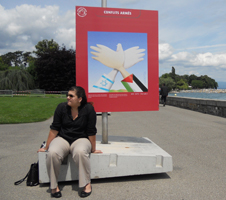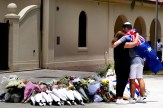From undergraduate paper to global policy document

It’s not often than an undergraduate term paper turns into an internationally circulated policy document. But that’s exactly what happened to Tori Porell, a sophomore international affairs major at Northeastern University, who is wrapping up a six-month co-op at the Geneva Centre for Security Policy (GCSP) in Switzerland.
Porell wrote about climate change and its impact on food supplies for an honors course during her sophomore year, just before leaving for the GCSP.
“I really liked the topic, so I brought it to my bosses (in Geneva) and they encouraged me to pursue it further,” she said. This September, that work will be published as a GCSP policy paper that argues that the outcome of climate change is dispersed in place and time, meaning its effects are unevenly distributed worldwide, leading to food shortages and natural disasters in areas that are not significantly contributing to climate change, such as developing nations.
Porell’s six-month co-op in Geneva, which ends this month, was not her first foray into international security: before leaving Boston, she worked as an intern at Harvard’s quarterly Journal for International Security. “I absolutely knew I wanted to go abroad for global co-op,” Porell said. “Because I already knew my way around the world of global security — to discover that I could work in the field abroad seemed like a really great opportunity.”
She was also the lead author on a book chapter about corruption and national security, which will be published this November by the Indian Ministry of Defense, and the coauthor of a chapter about the International Security Assistance Force in Afghanistan.
“It will be something like a field guide for journalists and aid workers in the country,” Porell said of her work on security in Afghanistan. “We did research on the major issues they might encounter, speaking to military and security experts who had experience on the ground.”
Her co-op in Geneva was not her first time pursuing international affairs abroad. Last year, Porell spent nine weeks on a Dialogues of Civilization trip to Jordan, Syria and Israel that focused on international affairs. Looking ahead, she hopes her next co-op will bring her back to the Middle East or to Africa, where she could once again pursue the practical applications of global security similar to her research in Boston and Geneva.
“I want to continue to see how my research applies in the international security and development arenas,” Porell said. “At this point, I understand how the international system works, so now I want to take that theoretical understanding and see it in action.”




